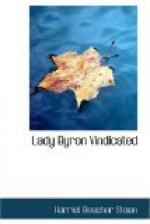Now Lord Byron’s charge against his wife was that she was directly responsible for getting up and keeping up this persecution, which drove him from England,—that she did it in a deceitful, treacherous manner, which left him no chance of defending himself.
He charged against her that, taking advantage of a time when his affairs were in confusion, and an execution in the house, she left him suddenly, with treacherous professions of kindness, which were repeated by letters on the road, and that soon after her arrival at her home her parents sent him word that she would never return to him, and she confirmed the message; that when he asked the reason why, she refused to state any; and that when this step gave rise to a host of slanders against him she silently encouraged and confirmed the slanders. His claim was that he was denied from that time forth even the justice of any tangible accusation against himself which he might meet and refute.
He observes, in the same article from which we have quoted:—
’When one tells me that I cannot “in any way justify my own behaviour in that affair,” I acquiesce, because no man can “justify” himself until he knows of what he is accused; and I have never had—and, God knows, my whole desire has ever been to obtain it—any specific charge, in a tangible shape, submitted to me by the adversary, nor by others, unless the atrocities of public rumour and the mysterious silence of the lady’s legal advisers may be deemed such.’
Lord Byron, his publishers, friends, and biographers, thus agree in representing his wife as the secret author and abettor of that persecution, which it is claimed broke up his life, and was the source of all his subsequent crimes and excesses.
Lord Byron wrote a poem in September 1816, in Switzerland, just after the separation, in which he stated, in so many words, these accusations against his wife. Shortly after the poet’s death Murray published this poem, together with the ‘Fare thee well,’ and the lines to his sister, under the title of ‘Domestic Pieces,’ in his standard edition of Byron’s poetry. It is to be remarked, then, that this was for some time a private document, shown to confidential friends, and made use of judiciously, as readers or listeners to his story were able to bear it. Lady Byron then had a strong party in England. Sir Samuel Romilly and Dr. Lushington were her counsel. Lady Byron’s parents were living, and the appearance in the public prints of such a piece as this would have brought down an aggravated storm of public indignation.




